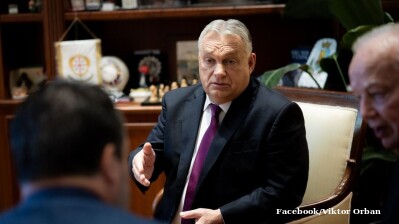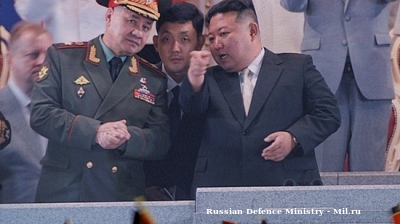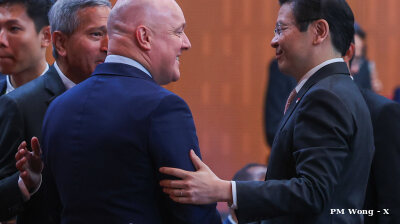A court in the Russian city of Yekaterinburg has sentenced US journalist Evan Gershkovich to 16 years in prison on espionage charges, following a trial condemned by the US government as a "sham."
Gershkovich collected secret information about a defence industry company called Uralvagonzavod on orders from the CIA, the Russian Prosecutor General's Office lawyers claimed in a closed-door trial that concluded on July 19.
"During the trial it was established and corroborated with documents that the American reporter of the Wall Street Journal, Gershkovich, acted on the orders of the CIA in March 2023 as he collected secret information about the activities of the defence enterprise JSC NPK Uralvagonzavod in the Sverdlovsk Region, which produces and repairs military equipment. While carrying out the illegal actions, he made sure to use measures to evade detection," the agency said.
The American journalist was arrested in March 2023 while on a reporting trip to the city of Yekaterinburg, 1,000 miles east of Moscow, where he interviewed workers coming out of the factory.
Gershkovich was found guilty of being a spy in a closed trial, with no evidence made available to the public. In Russia, espionage charges carry a maximum sentence of 20 years in prison. The prosecution had requested an 18-year prison sentence for the Wall Street Journal reporter.
Typically, the judge eventually settled on giving Gershkovich a sentence just short of the maximum, a sentence of 16 years. Russian trials have a 99% conviction rate.
Gershkovich's sentencing marks the first time an American journalist has been accused of espionage in Russia since the Cold War. Despite being officially accredited by the Russian Foreign Ministry, Moscow claimed he was gathering military secrets for the CIA. Both The Wall Street Journal and the US Government have vehemently denied these allegations.
On the first anniversary of Gershkovich’s imprisonment the Wall Street Journal ran a front page with a large blank space headlined “His story should be here” to protest his arrest.

Before the trial began, the US Embassy in Moscow stated that the Russian authorities had “failed to provide any evidence supporting the charges against him” and had “failed to explain why Evan’s work as a journalist constitutes a crime.”
“We have been clear from the start that Evan has done nothing wrong and never should have been arrested in the first place. His case is not about evidence, procedural norms, or the rule of law. It is about the Kremlin using American citizens to achieve its political objectives,” the statement said.
Following the judgement, the Wall Street Journal, Gershkovich’s employer, reiterated their position that he was completely innocent and had been wrongfully convicted.
“This disgraceful, sham conviction comes after Evan has spent 478 days in prison, wrongfully detained, away from his family and friends, prevented from reporting, all for doing his job as a journalist,” Almar Latour, the chief executive of Dow Jones and publisher of The Wall Street Journal, and Wall Street Journal Editor in Chief Emma Tucker said in a statement. “Journalism is not a crime, and we will not rest until he’s released. This must end now.”
A day before the sentence was announced, Russian Foreign Minister Sergey Lavrov told journalists in New York that Moscow has “irrefutable” proof that the journalist was guilty of espionage.
In Russia, trials for espionage can often last for months. Unusually, Gershkovich’s trial lasted just three days, and was moved forward a month from the planned start date of August 13.
This haste has fuelled speculation about an imminent prisoner swap. Russian authorities, including President Vladimir Putin and his spokesman Dmitry Peskov, have suggested that negotiations for an exchange are underway, potentially involving Vadim Krasikov, who is currently imprisoned in Germany for the assassination of a Chechen exile.
Spy swaps
Under the unspoken rules of prisoner swaps, the victim usually has to be convicted of the crimes of which they are accused before they can be swapped. The good news is Gershkovich's conviction clears the way for a prisoner swap deal to go ahead.
In another celebrity case of the arrest of US fund manager Michael Calvey on embezzlement charges in 2019, that was the result of a commercial dispute with a Russian co-investor, Calvey was eventually released after spending over two years in a Russian jail – but only after he was convicted of the alleged crime.
In that case, which Clavey was careful not to make political, the court issued a 5.5 year suspended sentence and he was allowed to leave Russia. Notably the US authorities did not get involved in the case; indeed, they were specifically ask not to comment on the case, according to bne IntelliNews sources close to the case.
Separately, on December 8, 2022, Russia and the United States conducted a one-for-one prisoner exchange, trading US basketball player Brittney Griner, who was arrested for bring cannabis oil into Russia, for Viktor Bout, a notorious Russian arms dealer. Sarah Krivanek, an American detained for a domestic violence dispute, was deported from Russia on the same day as Griner's release.
Like Calvey, Griner pled guilty to the charges against her on the second day of her trail that July but added, "But there was no intent. I didn't want to break the law".
Bout had been arrested in Thailand in 2008 and transferred to the custody of the United States, where he was convicted of terrorism-related charges and sentenced to 25 years in prison in 2012. He has since gone on to become a Russian Duma deputy.
The former US Marine Paul Whelan remains in a Russian jail, imprisoned on espionage charges in 2018 and is also awaiting a deal. The White House psuhed for Whelan to be included in the Griner deal, but the Kremlin said that Whelan was an agent and so required an exchange of comparable value such as assassin Krasikov, who remains in a German jail.
Calvey’s story ended with a happy ending. Russia's prisons service expunged Calvey’s case and the sentence from its register entirely after the probation period on his sentence expired in May, Reuters reported. Calvey’s name has been cleared and his criminal record deleted.
The probation period ended on April 5, 2024, according to a note seen by Reuters from Russia's federal prison service, FSIN.
"I am relieved that the unfair and unlawful conviction in my case has finally been vacated and nullified," Calvey, who had already left Russia after his detention restrictions were eased, said in a statement. "The investigation against us was wrongful from the beginning and it took a significant toll on everyone involved." Not politicising the case paid off.
Gershkovich has been much unluckier as his case became political from day one and his arrest immediately provoked a bitter complaint from the White House. While Calvey was able to eventually talk and lobby his way out of jail, Gershkovich’s only hope of an early release is a political swap deal.
News

European diplomacy should have stopped war, Orban tells Italian broadcaster
The job of European diplomacy would have been stopping the war in Ukraine, but Brussels has become "irrelevant" by deciding not to negotiate, Prime Minister Viktor Orban told an Italian TV channel on October 28.

Zelenskiy allows the start of controlled arms exports
President Volodymyr Zelenskiy ordered Ukraine’s Ministry of Defence to begin the controlled export of domestically produced weapons starting in November for the first time in the hope of boosting production and attracting investment.

North Korea fires cruise missiles to mark Trump's arrival in the South
State media framed the launch as a reminder of North Korea’s military strength to what it described as its enemies. The launch does not breach United Nations restrictions, since the rules prohibit ballistic missile testing, not cruise missiles.

Singapore PM Lawrence Wong heads to APEC in bid to deepen Seoul ties
The visit will be Wong’s first trip to South Korea since he assumed office in May 2024, and the first by a Singaporean prime minister since 2019 – in part to recognise the 50th anniversary of diplomatic relations between the two nations.



